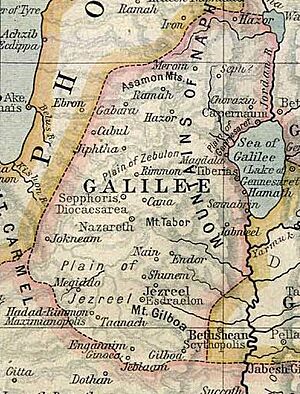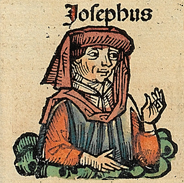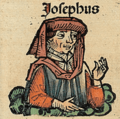Josephus facts for kids
Quick facts for kids
Flavius Josephus
|
|
|---|---|
| Born | c. AD 37 |
| Died | c. AD 100 (aged 62–63) |
| Children | 5 sons |
| Academic background | |
| Influences | |
| Academic work | |
| Era | Hellenistic Judaism |
| Main interests | |
| Notable works |
|
| Influenced |
|
Flavius Josephus (born around AD 37, died around AD 100) was an important historian and military leader. He lived in the 1st century AD. He was born in Jerusalem, which was then part of the Roman province of Judea. His father was a priest, and his mother came from a royal family.
Josephus is best known for his book The Jewish War. He first fought against the Roman Empire during the First Jewish–Roman War. He was a general for the Jewish forces in Galilee. In AD 67, he surrendered to the Roman army after a six-week siege of Yodfat.
Josephus believed that old prophecies about a Jewish leader referred to the Roman commander Vespasian. Because of this, Vespasian decided to keep Josephus as a slave and possibly as an interpreter. When Vespasian became Roman emperor in AD 69, he freed Josephus. Josephus then took the Emperor's family name, Flavius.
After being freed, Flavius Josephus joined the Roman side. He became a citizen and a friend and advisor to Vespasian's son, Titus. Josephus helped Titus as a translator during the siege of Jerusalem in AD 70. This siege led to the city's destruction and the burning of Herod's Temple.
Josephus wrote about the First Jewish–Roman War (AD 66–70), including the famous siege of Masada. His most important books are The Jewish War (written around AD 75) and Antiquities of the Jews (written around AD 94). The Jewish War tells the story of the Jewish revolt against Roman rule. Antiquities of the Jews shares the history of the world from a Jewish point of view for Greek and Roman readers. These books give us valuable information about Jewish life in the first century and the early days of Early Christianity. Josephus's writings are a main source, besides the Bible, for the history of ancient Israel. They also mention figures like Pontius Pilate, Herod the Great, John the Baptist, James the Just, and possibly Jesus of Nazareth.
Flavius Josephus: A Roman-Jewish Historian
Early Life and Military Role
Josephus was born into a wealthy and important family in Jerusalem. His father, Matthias, was a Jewish priest. His mother came from the Hasmonean royal family. Josephus was educated in Jerusalem alongside his brother.
When he was in his mid-twenties, Josephus traveled to Rome. He went to talk with Emperor Nero to help free some Jewish priests. When he returned to Jerusalem, the First Jewish–Roman War began. Josephus was made the military governor of Galilee.
However, Galilee was divided. Some towns, like Sepphoris and Tiberias, wanted peace with the Romans. Others wanted to fight. Josephus also had to deal with John of Gischala, another Jewish leader who wanted control of Galilee. Josephus strengthened many towns in Galilee to prepare for the Roman attack. He fought against the Roman army at a village called Garis. Eventually, he resisted the Romans during the siege of Yodfat until the city fell in AD 67.
Josephus and the Roman Empire
After the city of Yodfat fell, the Romans killed many people. Josephus said he was trapped in a cave with 40 companions. The Romans, led by Vespasian and his son Titus, asked them to surrender. Josephus said they decided to kill each other by drawing lots. Josephus was one of the last two men left, and they surrendered to the Romans.
In AD 69, Josephus was set free. He claimed he had a special vision that Vespasian would become emperor. When this prediction came true, Vespasian believed Josephus had a divine gift. Josephus then worked as a negotiator during the siege of Jerusalem in AD 70. During this time, his parents were held hostage by Simon bar Giora.
In AD 71, Josephus went to Rome with Titus. He became a Roman citizen and was supported by the ruling Flavian dynasty. This is why he is often called Flavius Josephus. He was given a home in Judea and a pension. While in Rome, he wrote all his famous books.
Josephus married several times. He had five sons, but only one, Flavius Hyrcanus, lived to adulthood. His last wife was a Greek Jewish woman from Crete. They had a happy marriage and two sons, Flavius Justus and Flavius Simonides Agrippa.
Some people saw Josephus as a traitor because he joined the Romans. But he saw himself as a law-observant Jew who believed Jewish ideas could fit with Greek and Roman thinking.
Important Writings by Josephus
Josephus's books are very important for understanding Jewish life and history in the first century.
- (Around AD 75) War of the Jews, also known as The Jewish War
- (Around AD 94) Antiquities of the Jews
- (Around AD 97) Against Apion
- (Around AD 99) The Life of Flavius Josephus, his autobiography
The Jewish War: A Story of Conflict
Josephus's first book in Rome was The Jewish War. He wrote it in Greek, but first in his "paternal tongue," likely Aramaic. This seven-volume book starts with the Maccabean Revolt and ends with the fall of Jerusalem and other fortresses like Masada. It also describes the Roman victory celebrations.
Josephus wrote The Jewish War to correct wrong ideas about the Jews. He wanted to show that Jews were not naturally against Roman civilization. Instead, he blamed the war on "over-zealous fanatics" among the Jews. He said these people led the Jewish masses away from their traditional leaders, like himself. He also blamed some corrupt Roman governors. Josephus argued that loyal Jews could live peacefully under Roman rule because their faith taught that God gives empires their power.
Jewish Antiquities: A Look at History
Josephus finished his twenty-one-volume book, Antiquities of the Jews, around AD 93 or 94. In this work, he explained Jewish history, laws, and customs. He wanted to show how old and important the Jewish people were. Josephus said he wrote this history because he saw that others were twisting the truth about Jewish events. He used the Hebrew Scriptures as his source and also his own experiences from the wars.
He started Jewish history from the creation of the world. He wrote that Abraham taught science to the Egyptians, who then taught the Greeks. He described Moses as setting up a priestly government, similar to Rome's. He presented important figures from the Tanakh (Hebrew Bible) as wise leaders. He also included a part about his own life, explaining his actions during the war when he worked with the Romans.
Against Apion: Defending Jewish Beliefs
Josephus's book Against Apion has two volumes. It defends Judaism as an ancient and wise religion and philosophy. He argued that Jewish traditions were much older than Greek ones. He also responded to false accusations against Jews made by a Greek writer named Apion.
Why Josephus's Works Are Important
Josephus's writings give historians important details about people, groups, customs, and places. For example, he mentioned that there were 240 towns and villages in Galilee during his time. His books are the main source for the list of Jewish high priests during the Second Temple period.
He also described Jewish customs, like hanging a linen curtain at a house entrance. He noted that Jews ate their Sabbath meal around noon. He even mentioned that Jewish men could have many wives (polygamy).
His writings are a key source for understanding the time after the Jewish exile, including the Maccabean Revolt, the Hasmonean dynasty, and the rise of Herod the Great. He also wrote about different Jewish groups like the Sadducees, Pharisees, and Essenes. He described Herod's Temple, the census by Quirinius, and the Zealots. He also mentioned figures like Pontius Pilate, Herod the Great, Agrippa I and Agrippa II, John the Baptist, James, the brother of Jesus, and Jesus. Josephus's works are very important for studying Jewish life after the Temple was destroyed and for understanding early Christianity.
Thanks to Josephus's detailed writings and years of digging, archaeologist Ehud Netzer found what he believed to be Herod's Tomb. It was found above aqueducts and pools, on a flat desert site, 12 km south of Jerusalem. This matched Josephus's descriptions.
Josephus's writings are also the first known source for many stories that are now considered part of Biblical history, even if they are not in the Bible itself. These include the idea of Ishmael as the founder of the Arabs and the story of the siege of Masada.
Josephus's Life in Rome
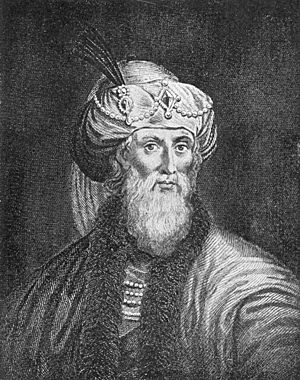
Josephus was very popular with Christians from the 4th century onwards. They saw him as an independent witness to events before, during, and after the life of Jesus of Nazareth. His works were translated into Latin and later into many European languages. The 1732 English translation by William Whiston became very popular. Many Christians owned it, often second only to the Bible.
However, among Jews, Josephus was not as well-known for a long time. He was often seen as a traitor. Rabbinical writings for a thousand years after his death rarely mentioned him by name. But in the 10th century, an Italian Jew wrote the Yosippon, which retold parts of Josephus's works. This helped bring Josephus back into Jewish awareness.
By the 20th century, Jewish views on Josephus softened. He was seen as someone who gave Jews an important place in ancient history. For example, the story of the last stand at Masada, which was once seen as crazy, was reinterpreted as an inspiring act of courage.
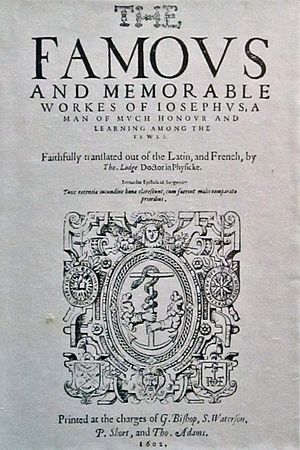
Images for kids
See also
 In Spanish: Flavio Josefo para niños
In Spanish: Flavio Josefo para niños
 | Claudette Colvin |
 | Myrlie Evers-Williams |
 | Alberta Odell Jones |


